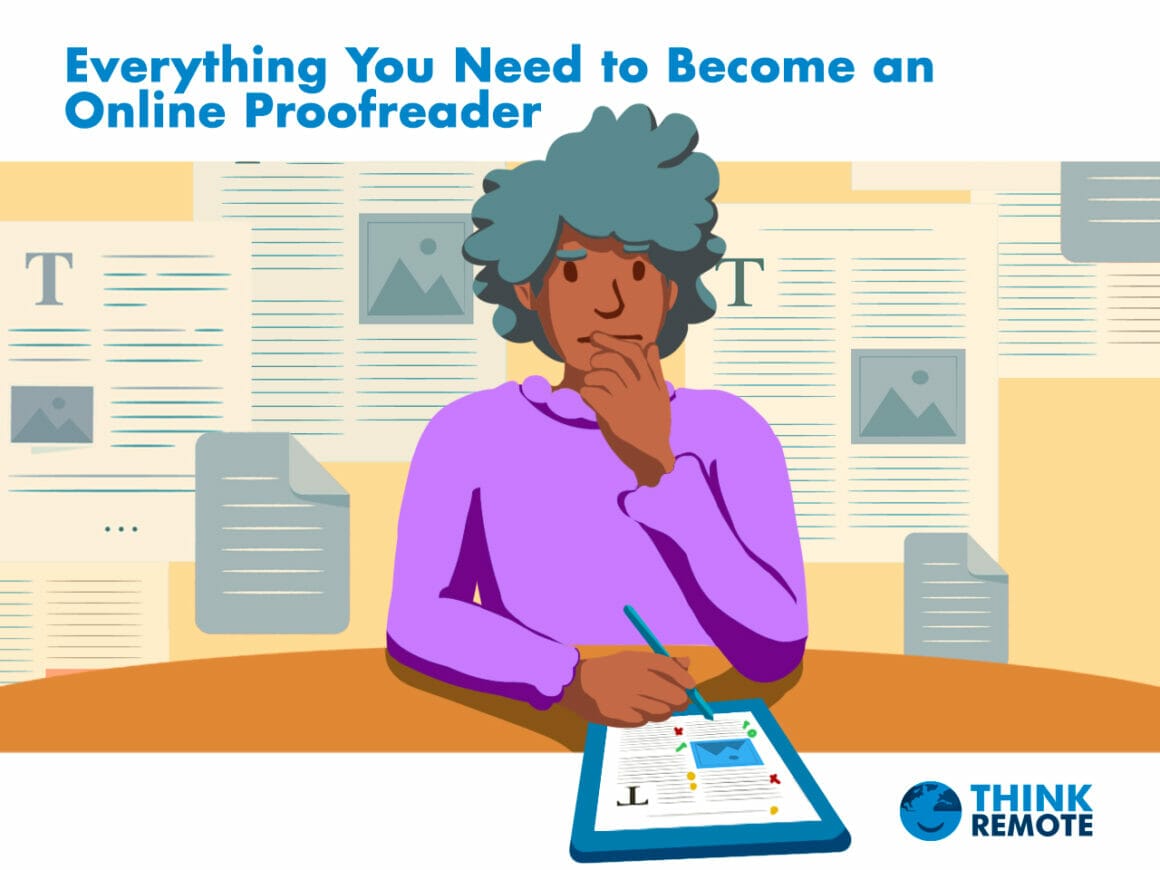Are you wondering how to become a proofreader? It’s a great career choice for people who love words and writing. It’s also perfect for remote and flexible working, with many people building a proofreading business that fits around other commitments.
But how do you get started?
What is an Online Proofreader?
Do you enjoy reading and writing, have a passion for grammar, and have an internal red pen that marks every sentence you read? If so, proofreading might be for you!
A wide range of written materials needs proofing, including social media posts, blogs, reports, white papers, proposals, and books.
People often confuse two roles: proofreader and copy editor, but the jobs are quite different. A proofreader is usually the last person to look at a document before it is sent out or published. A copy editor works with a writer, usually on a book or longer piece of writing, who advises on the plot, use of language, and the more technical aspects of writing. On the other hand, a proofreader looks for incorrect word choice, grammar, and punctuation errors.
There are three different types of proofreaders; general, publisher, and specialist. The first is proofreading any documents, including letters, emails, social media posts, etc., while the second is looking at blog posts and printed content. Specialist proofreaders earn a little more, but they have experience working in specific fields, such as medicine, science, engineering, etc.
How To Become A Proofreader Online With No Experience
If you’re wondering how to become a proofreader from home, we have the information you need, even if you’ve never done the job before. To excel as a grammar-checking guru, especially if you’re going to be a freelancer, you need a combination of personal qualities, skills, and equipment.
Here’s a structured pathway to guide you through the process:
1. Educate Yourself:
- Grammar and Style Guides: Familiarize yourself with essential grammar rules and style guides like the AP Stylebook or the Chicago Manual of Style.
- Online Courses: Enroll in online proofreading courses. Some popular ones include Proofread Anywhere’s General Proofreading course or courses on platforms like Udemy and Skillshare.
2. Take a Proofreading Test
If you’re not sure how great your proofreading skills are, you can always take a proofreading test to see how suited you are to the role. In fact we’ve put a little test in the title above, did you spot it? Here are some sites where you can test your capabilities:
- Proofreading Exercise from Freelance Writing
- Three tests at Editing Tests
- Earn Smart Online Proofreading Quiz
How did you do? If you found all the mistakes then you have what it takes.
3. Practice Regularly:
- Daily Exercises: Engage in daily grammar exercises and proofreading practice to hone your skills.
- Online Quizzes: Take online proofreading quizzes and tests to evaluate your progress.
4. Work on the Skills for a Successful Proofreader
Working as a proofreader requires a certain set of qualities and skills. It isn’t for everyone, and personality is an important part of the mix. This job can be a great fit for stay-at-home moms looking to balance family commitments with a flexible work schedule. Skills required for proofreading include:
- Strong written language skills (most roles require English)
- An eye for detail. Remember, spelling and grammar checkers will have been used so you’ll need to keep a sharp eye out for mistakes they’ve missed, like mixing up affect and effect.
- Effective time and task management
- Good communication
5. Get the Necessary Tools and Training for Aspiring Proofreaders
Of course, it isn’t just about your skills and personal qualities, if you want to win proofreading jobs online for beginners then you’ll need tools, training, and to be able to prove your ability.
Tools
When working as a proofreader, your basic kit is a computer and an internet connection.
Having reliable broadband is great if you are working from a home office, but if you want to work from coffee shops, libraries, or join the digital nomad lifestyle then its worth thinking about a cellular package that offers you enough data to cover your work as well. You will also need:
- Google Docs: This is often a choice by smaller organizations as it gives you a lot of word processing power, as well as collaboration tools including tracked changes and version history and, is free to use.
- Microsoft Word: Another common word processor, if your clients use Microsoft Word you can convert them into Google Docs and back but it goes occasionally changes the formatting so paying for an Office 365 subscription might be a good business expense.
- An advanced spelling and grammar checker: There are a few choices available, such as Grammarly which works as a browser extension, Hemingway App which is a standalone website or desktop app, and PerfectIt which integrates with Word. They all go that one step further than the spelling and grammar checkers that come as standard and will do some of your job for you.
- Style guides: The most commonly used are AP and Chicago but some organizations have their own in-house guides.
- A website and other online profiles to start building your profile in the industry.
Training
There is no recognized proofreading qualification, and most people who work in this field have an English degree or similar.
While you don’t need training to get started, it’s can give you a competitive edge against other proofreaders. You can find text correction courses online for free, but they will sometimes charge for the documentation that proves you are a certified proofreader. If you’re interested in how to become a certified proofreader then these websites might be of interest.Course Details Cost General Proofreading: Theory and Practice This workshop has been running for over 7 years and provides an introduction to proofreading including why it might be right for you and where you can find prospects. Free
Writing Editing Masterclass on Skillshare91% of over 4,000 participants say their expectations were met or exceeded with this comprehensive course that includes assignments to test your skills Free Trials of Skillshare are available, the monthly cost of $32 after that expires.
How to Find and Correct Writing Errors on UdemyGiving you a certificate of completion, this course, the tutor has over 10 years of experience as a magazine and newspaper editor and has a 4.6/5 rating. £59.99 (discounts often available)
Becoming a Proofreader on KnowadaysNot just a course but a career opportunity. Complete this course and score over 80% and you are guaranteed work with their partner, Proofed. £299
Editing and Proofreading Made Simple on LinkedInAimed at people who want to proof their own work, this course offers the basic proofing skills and includes a certificate of completion. From $19.99 per month to access LinkedIn learning (free trial available)
6. Build an Online Presence:
- Portfolio Website: Create a professional portfolio website showcasing your proofreading skills and any completed projects or coursework.
- Social Media: Maintain a professional social media presence, especially on platforms like LinkedIn.
7. Network and Connect:
- Online Communities: Join online proofreading and editing communities to connect with others in the field and learn about job opportunities.
8. Land Your First Proofreading Job: Tips and Platforms
The final stage is to find yourself working as a proofreader. At this point, you have a choice – are you going to look for either freelance proofreading opportunities or for a full-time job within a company? If it’s the former, then all the traditional job listing sites will help you. If you’re looking to join the gig economy and take on freelance work, then you’ll need to look at sites like:
- Fiverr – one of the best-known freelancing sites, Fiverr gives you a platform for your freelance proofreading business. You can list gigs, setting your own details and pricing for free (you pay when you get work) but it is a competitive marketplace.
- Upwork – another freelancing marketplace, but on Upwork employers list projects and you bid on them, letting you see what your clients are willing to pay.
- Flexjobs – a dedicated remote working recruitment site, if you’re looking for a full-time job as a proofreader, this is the site for you.
- Contena – This is a dedicated site for writing services, and all the roles they list are remote. You have to apply to join and it is a membership platform, the cost is around $500 but they don’t publish that on their site.
- Proofread Now – a proofreading services site, that list their vacancies here.
- Edit911 – this site offers a very high standard of proofreading – they only hire PhDs. If you’re a doctor, send them your resume and a cover letter.
9. Maintain Professionalism:
- Timely Deliveries: Ensure that you meet deadlines and maintain clear communication with clients.
- Continuous Improvement: Seek feedback for continuous improvement and strive to deliver high-quality work.
Ready to Become a Proofreader?
Now you know what it takes, are you ready to take the next step and help writers worldwide know the difference between their, there, and their, and how to use the Oxford Comma?
We hope so! Best of luck on your journey to making the world better, one typo at a time.






